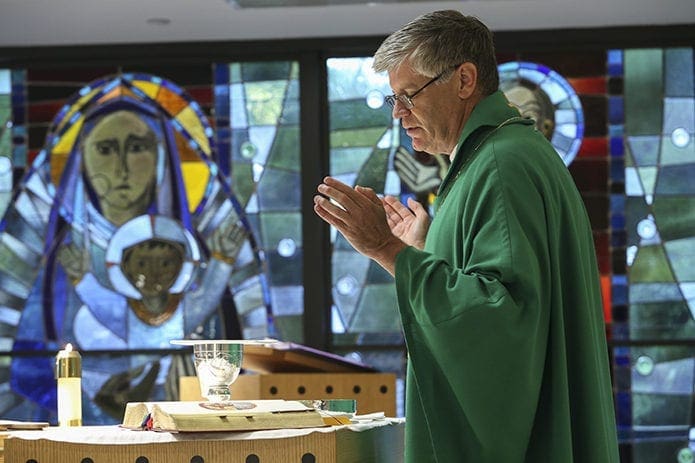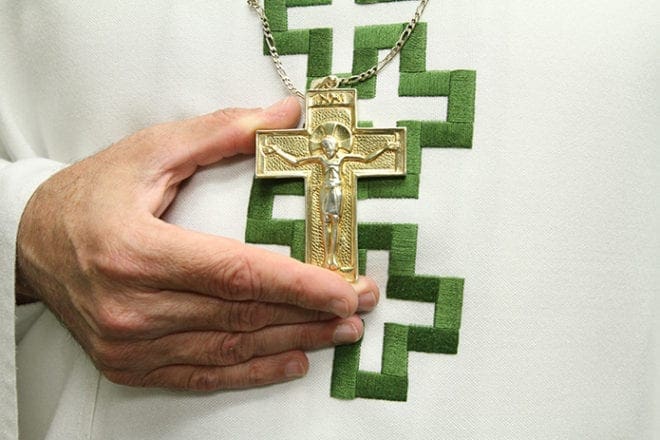 Photo By Michael Alexander
Photo By Michael AlexanderAtlanta
An interview with ‘Bishop Ned’
By MARY ANNE CASTRANIO, Staff writer | Published August 4, 2017
ATLANTA—The spacious office on the third floor of the Chancery is mostly empty, awaiting the belongings and activities of its new owner. In the time since his announcement May 18 as the new auxiliary bishop of Atlanta, Bishop Bernard E. “Ned” Shlesinger III has moved to Atlanta from Philadelphia, where he had served as the director of spiritual formation at St. Charles Borromeo Seminary for the past few years. His new office has a computer and furniture but not much more.
On June 30, in this office where his new ministry is just beginning, Bishop Shlesinger sat down for an interview with The Georgia Bulletin, providing some spiritual perspective along with more details about his history.
GB: You grew up in a Catholic family. What effect did your parents have on your faith growing up?
They had a profound effect … (My mother) said to me, “I married your father because he was a good man and he (would help) me get to heaven.” So I knew at that point … that whatever decision I made with my life, it had to be in reference to where I was going—was I going to heaven or not? It wasn’t a question about choosing something for myself; it was choosing … the life that leads somewhere.
My parents never missed Mass on Sunday. It was no question in our life, in our house, about going to Mass or not. We’re going, and this is not an option for children.
GB: Was your dad the same way?
My dad was a very good Catholic. He was more the one that was trained to think about theology and the faith.
My mother was more trusting. … The Church says this. This is the Church teaching. … She was very obedient as a Catholic. …
My dad taught us to think. He was Jesuit trained.
GB: Who was your confirmation saint?
St. James, after my brother, Jim. He was my sponsor for confirmation.
GB: Is there a Bible verse that inspires you?
My coat of arms is going to be “Christ must increase” (Jn 3:30). That for right now is important to me, but there have been other verses in the past. Mary’s response, “May it be done to me according to thy word” (Lk 1:38). That’s inscribed on the bottom of my chalice. “I am the vine, you are the branches.” That would be important. “If you remain in me and I in you, you will bear much fruit; apart from me you can do nothing.” That’s John 15:5.
GB: Is there a mentor or hero who inspires you?
As far as saints go, St. John Paul II and Mother Teresa, St. Ignatius of Loyola, St. Thérèse of Lisieux. She’s great, one of my favorites.
GB: How about persons who inspired you?
Well, I think Abraham Lincoln would be one. He’s very inspirational to me. … If you ever do a web search, Google Abraham Lincoln’s failures, and you’ll see that he was the guy that had to, through all the failures, learn how to persevere. And that taught him how to keep the nation together during the time of great crisis.
Lincoln would be a great hero of mine, as far as historical figures.
GB: How did you get interested in the Air Force?
My father was a navigator and bombardier during World War II. I felt first, a need to do something altruistic, something not for myself, but for my country. And then as far as flying goes, I thought if I joined the Air Force that would be the one thing I would like to do.
… I was in the ROTC for the four years I was at Virginia Tech.
GB: Were you in the Air Force during any action?
Not really. I can say I was in during the Cold War … 1983 to 1990. The only engagement I was involved in, which really wasn’t a major thing, was when they took Gen. (Manuel) Noriega out (of Panama). … I was flying in what was maybe considered a hostile zone, but I wasn’t in any danger.
GB: Was the C-130 the main plane that you flew?
Yes. I flew that from 1985 until 1990, pretty much.

Bishop Bernard E. “Ned” Shlesinger III holds the pectoral cross that was given to him by Archbishop Wilton D. Gregory. Photo By Michael Alexander
GB: Did you do any disaster response?
Well, my job was to move the Army. The Army did the disaster response. … I went down to Ecuador because … there was an earthquake there. The Army had to fix the roads, fix the pipelines.
… Our combat mission was to drop paratroopers and resupply the Army. So that was by the air. But we can drop equipment; we can land equipment. We were basically cargo.
GB: Do you still fly?
No. I haven’t flown since I left the Air Force. I haven’t had time!
GB: In the priesthood, part of your time in Raleigh, you were in missions that are Hispanic. What were the missions like where you worked?
Most of the people that I served were not migrant workers. They worked in either construction or landscaping or factories … processing plants.
(The parishes were) usually 45 minutes to an hour from Raleigh … in rural areas. For instance, one parish where I worked, Butterball had the largest processing plant: 50,000 turkeys a day.
GB: Is the Hispanic population growing there, as it is here?
Definitely. I don’t think it’s growing like it did years ago. The reality is, for many years the government did nothing about the undocumented workers, so many came over and did jobs that other people didn’t want. … 9/11 changed everything. Now you have this question: Are people going to take a risk in hiring now because the government is clamping down more. …
So for 20 years they said, come on over, we’re not going to do anything. By not doing anything, they created the problem. Now that they realize that they have to secure the borders, they have all these people that came here, (who now have) children, (who are) citizens, born here.
It’s a human issue. You cannot deport people and break families up.
You can secure the borders and all that, and that’s fine.
But that’s not what we’re talking about. We’re talking mostly rights. People have a right to immigrate. … All the Catholic social teaching is on the USCCB website. That’s what needs to be gotten to the people.
GB: Was there a time you were challenged in your ministry as a priest?
I think with anything, whether it’s marriage or priesthood or in any vocation, you can never get settled into it. You can never get stagnant. You always have to continue to cultivate the heart and to continue to grow.
I think there’s a great danger in settling into something, which ultimately becomes unsettling. … The heart has to always be on fire and to grow. I think there’s a challenge to continue to pray for that fire, the enthusiasm, the power of the Holy Spirit, to continue to push you forward, and to grow deeper in love and fall into greater love.
What I see about priesthood, sometimes I compare it to marriage. … The lifestyle can be very dangerous, especially with kids. The kids leave the house; what does the couple have at home? … So those are the same things that can affect the priest. It’s not what he does that’s important. It’s who he is becoming.
GB: Same thing with all vocations. Or you have to be happy with what God sends you to do.
I think the challenge today is that people are looking for a situation in life that’s going to make them happy. And the real question they have to answer is, is Christ going to be their happiness? Is Jesus their foundation?
… If we’re looking for the situation, then we’re going to be cranky people because we’ll never have paradise. We can never make it. We can never create paradise for ourselves.
So, therefore, we need Christ to become our life and (then) death is gain (Phil 1:21).
You can have a good life for your daughter. You can try to provide that life. But she’s going to go out in the world and discover that it’s not the most welcoming place. … Who’s walking with her in that world? … Pope Benedict said it very well. He said he hoped that the youth would encounter in Christ, the one friend that would never disappoint them.
GB: How would you describe your work style?
I like to be with people. I’d rather have a conversation than deal with process. I think that the people in the process are very important, but not the process. So the thing that might drive me nuts is how to create a mission statement.
You can give a direction, which is important. We need a direction. But we need a team to do it.
GB: Consensus and teamwork?
Yes, I would say so.
Sometimes you talk about how to write the program. The program for me is a person. … The seminary used to ask me what is the program. There’s a whole thing that describes a seminary program, but for me … the program is the person of Jesus.
It’s the same with everything. We have to be centered not on being task-oriented but being people-oriented. It’s not what we are doing that’s important, but it’s about who we are loving and how we are loving them. … It’s about what he’s doing through us or what he’s doing in us.
And that’s why my motto is about ‘Christ must increase.’ … He’s not an idea. He’s a person who’s present in 2017, today, now.